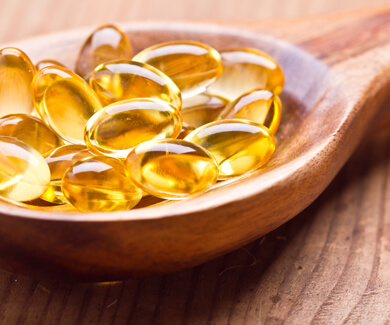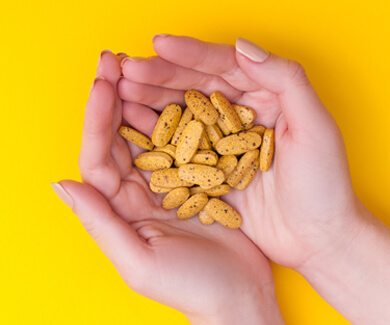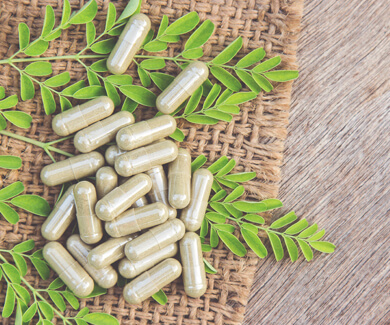For women with PCOS, taking supplements can easily become an unintentional gamble.
How do you decide what’s worth taking and what do you do to assess the risks? Wasting money is one thing, but anything powerful enough to do good, by its very nature has the potential to be harmful too.
Often the best answers are not what you’d expect.
Nutritional supplements are something I often get asked about by the thousands of women that complete my free 30 Day PCOS Diet Challenge. In some cases, I think supplements can be a useful part of a PCOS friendly lifestyle, but the key to how well they serve you all depends on the information at hand when you make your decisions.
With this in mind, here’s the six things I believe every woman with PCOS needs to know when considering taking supplements.
1. Look At The Most Obvious Risks First
The first mistake that I often see, is the understandable desire to try out esoteric compounds like testosterone-lowering herbs without first considering more powerful pathways to wellness.
As I describe in this free PCOS Nutrient Inadequacies Guide, given all the nutrient depletions that are so common in women with PCOS, it makes more sense to start your supplements enquiry with an assessment of your personal nutrient status.
Vitamins and minerals play an essential role in every step of our metabolism, brain functioning, and reproductive health so many of our apparent PCOS symptoms may be caused by a reversible nutrient inadequacy. Skin issues, hair loss, fatigue, moodiness, and brain fog for example, are classic signs that you’re missing important nutrients.
The standard drugs we’re prescribed are many times the main cause of this problem. For example, taking birth control can cause depletions of folic acid, vitamins B2, B6, B12, C and E, as well as the minerals magnesium, selenium and zinc (Palmery et al. 20139). That’s a lot of seriously important nutrients you don’t want to be short on.
Metformin also taxes your vitamin B12 (Aroda et al. 201610) which can lead to scary consequences particularly if you’re trying to conceive (Rogne at el. 201711; Sucharita et al. 201412; Huebner et al. 200813).
If you’ve been taking either of these drugs for an extended period (and also if you haven’t), then diagnosing and treating any personal nutrient deficiencies is going to have a much greater impact on your health and fertility than the latest wonder-supplement you read about online.
For anyone wanting to explore this further I recommend downloading this free PCOS Nutrient Inadequacies Guide which covers the most important nutrient depletion risks that every woman with PCOS should know about. In this guide, you’ll also find my recommended resource for determining your personal nutrient status which includes the exact name of all the tests you need, links to the labs, and 70 pages of detailed notes explaining how to interpret the findings.
2. Don’t Trust An Unregulated Industry
The US Food and Drug Administration (FDA), will tell you that dietary supplements are intended to supplement your diet and that they’re not drugs that are supposed to treat diseases like PCOS. A genuine bureaucrat might also give you a wink since this half-hearted statement is both understandably valid while also being completely unhelpful.
Of course supplements can help treat diseases like PCOS and the good ones are like drugs, it’s just that the FDA doesn’t regulate them that way. What this means for you is that you have unlimited access to medications that have limited scrutiny concerning safety and efficacy.
This is both and good and bad right?
It’s good if you’re well informed and are guided by a highly skilled medical professional, but it’s bad if you’re desperate to “try anything” in an attempt to get your PCOS symptoms under control.
The lack of regulation in the supplements industry means consumers are accepting more risks than when they buy pharmaceuticals. These risks include:
- A product being dangerous or harmful.
- Taking supplements that have an adverse effect on other medications (or supplements) you’re taking.
- Buying products whose active ingredients are either of poor quality or are in lower amounts than stated on the label (this problem is far more widespread than we’d like to believe).
- Being exposed to contaminated product due to ill-managed manufacturing practices.
The New York Times and the Canadian Broadcasting Corporation released a fantastic documentary examining these hidden dangers which I highly recommend watching for anyone taking supplements.
The take home point here is that when considering PCOS supplements, we need to understand the risks and know which brands we can trust.
If something is potent enough to make a genuine difference to your symptoms, then it’s also powerful enough to do you harm. And despite all the scientifically presented marketing hype, the majority of supplements are far less effective than they’re cracked up to be.
3. Critically Assess Health Claims Before Taking A PCOS Supplement
Want to know the easiest way to sound evidence based in the supplements business? Quote a study that supports your product.
When researching for my PCOS Supplements Guide here’s the questions I constantly kept asking myself whenever I saw a health claim with a scientific reference attached:
- Who did this study and where was it published? One of the oldest tricks in the book for supplement manufacturers is to commission a “study” with a marketing company that looks like a science establishment. You specify the results you want, and they’ll create the supporting evidence. What you want to see instead is a peer reviewed scientific paper published in a legitimate publication. One of the easiest ways to determine how credible the publication is, is to look up its Journal Impact Factor. A ranking of 4 and above puts it in the top 10% in terms of its scientific reputation, while if it doesn’t have a score that should probably be a red flag.
- Was the study done in a lab, tested on rats, or were real humans involved? This is sort of the pathway of progress for anyone trying to make a health claim. Good quality evidence comes from human trials that are preferably randomized and double blinded (which means neither the patient nor the researcher knows which is the placebo and which is the supplement until after the results are in).
-
How much difference was observed? It’s one thing for a PCOS supplement to “have an effect”, it’s quite another for that effect to be meaningful in real life. For example, myo-inositol is a popular PCOS supplement that has been shown in some trials (but not all) to help with weight loss. People promoting inositol products love this health claim…
- Have the results been replicated? One study doesn’t make a conclusive finding. If a PCOS supplement is really as good as the marketing people tell you, then the benefits will show up time and time again whenever it gets studied.
But out of all the high quality studies I looked at when writing my Beat PCOS Supplements Guide, the best I could find showed an average weight loss of just 2 pounds over 3 months (Gerli et al 20071). While I’m not saying inositol isn’t great for PCOS, to me the weight loss aspects are hardly worth getting excited about. Especially when you compare this to the weight loss results achieved during my free 30 Day PCOS Diet Challenge. It’s not uncommon to see women lose 5-15 pounds within just 1 month – and that’s without restriction dieting!
A good example of this is Berberine, which has been shown in many high quality studies to have a strong effect on blood glucose levels in women with metabolic syndrome (a condition that occurs in the majority of women with PCOS). The same can’t be said for the inositol and weight loss health claim I mentioned above with several studies showing this supplement to have no significant effect on body weight (Nordio and Proietti 20122; Genazzani et al. 20143; Santamaria et al. 20124).
For a truly non-biased summary of the 11 most proven PCOS supplements, this article will tell you what the science really says.
4. Don’t Be Blasé About Safety and Side Effects
I don’t know about you, but I can always hear my teenage self say “yeah, yeah, whatever” whenever I read a safety warning on a supplement label. Perhaps it’s my natural tendency to rebel against authority, but they often seem so exaggerated and unlikely.
I mean come on… do I really need to inform my doctor I’ve taken some vitamin C?
The problem with becoming de-sensitized to safety warnings is that when it comes to some supplements, it’s easy to become dangerously cavalier. Just because you can order it over the internet without a prescription, doesn’t mean it’s safe.
There’s multiple degrees of safety and side effects worth keeping in mind with PCOS supplements.
First there’s the products that are known to be harmful. I came across several examples of these when researching for my PCOS Supplements Guide. One of these was ephedrine which has been well proven to have a notable effect on weight management. This is why it’s used in many “diet pills” that you can still order online despite it being banned in the US after several deaths and other serious adverse effects were reported.
Chromium is another supplement that’s often marketed heavily toward women trying to lose weight. What no supplement company will tell you though is that there’s concern in the scientific community that this product causes cancer (Wu et al. 20165). To me there’s far better ways to achieve effective and sustainable weight loss.
The next level down, is the risk of interactions with other drugs you’re taking. While a given PCOS supplement may be relatively safe when taken on its own, if it messes with the effects of other medications you could easily land yourself in trouble. Berberine is a great example of this.
Berberine is one of the few PCOS supplements that’s been shown to have a similar level of efficacy to pharmaceutical drugs like metformin (Dong et al. 20126).
This is pretty exciting news for anyone that’s sick of metformin’s side effects, but berberine is also known to interact with antibiotics in a way that can lead to heart problems (Zhi et al. 20157). There’s evidence suggesting it may limit the effects of metformin (Kwon et al. 20158) and it’s unsafe during pregnancy so you need to be very careful when considering this supplement, especially if you’re trying to conceive.
Once you’re satisfied your chosen supplement doesn’t cause harm, and it won’t affect your other medications, there’s still the risk of unwanted consequences.
For example, during my free 30 Day PCOS Diet Challenge I often see women within the Challenge Facebook Group recommending magnesium and zinc to help with various symptoms. But it’s amazing how something as innocuous as these minerals, can actually be bad for you in certain circumstances. This is because of how minerals are balanced in our bodies with the levels of one, affecting another.
For example, if you take too much magnesium you can mess up your calcium balance, while too much zinc might lower your copper or iron. I don’t want to discourage anyone from taking these often very helpful minerals, it’s just you need to be aware that these supplements are complicated. The value of a skilled health professional to help guide you should not be underestimated.
5. Don’t Underestimate Food For Nutrition
While it’s a little too cute for my liking, the FDA’s advice that dietary supplements are only meant to supplement your diet points to a fundamental belief that I share. While supplements have played an important role in my own recovery from PCOS and natural pregnancy, I think it’s uncontroversial to say that if we eat better, we’ll have far less need for supplements.
It’s easy to underestimate just how powerful the right diet can be when it comes to treating PCOS.
Take weight loss for example. Rather than spending all your money on another dubious supplement, it’s far more effective to eat in a way that reduces body fat without leaving you hungry.
The thing about food is that you have to eat it anyway, so choosing the right things to nourish yourself with provides a long term sustainable solution that goes well beyond the benefits of any supplement regime.
Food is always the best source of nutrition. It’s entirely safe and amazingly effective.
6. Know Where to Get Help
Clearly there’s a lot to think about when considering PCOS supplements, which is why I always recommend getting professional help rather than taking matters into your own hands.
The information available in my free PCOS Nutrient Inadequacies Guide can be a useful place to start thinking about this problem, but in my experience a functional medicine practitioner or naturopathic doctor is almost always going to be the best person to see when it comes to treating PCOS with supplements.
Unlike conventional physicians who need you gone in 15 minutes, these highly qualified doctors take the time and effort to understand your unique situation and the underlying issues. This can be a totally mind-blowing experience if all you’ve ever been used to in the past is band-aid solutions like the pill. A functional medicine doctor can order the right tests, monitor dosages and progress, as well as recommend their most trusted supplement brands.

The interesting thing about functional medicine, is that despite also being trained in conventional medicine, they always start with dietary changes.
So while you’ll always get the best results with personalized advice, you can get yourself 90% of the way by switching to a PCOS friendly diet first. Given that great health care is expensive, teaching yourself how to treat PCOS using food as medicine can save you thousands of dollars in the long run.
This is exactly why I created my free 30 Day PCOS Diet Challenge and 3 Day PCOS Meal Plan because unlike supplements, good food is the one thing I think every woman with PCOS should self-prescribe.
xo Kym
Author
As a Nutritionist, I’m continuing my mission to help women like you, beat PCOS. Evidence-based diet and lifestyle interventions helped me overcome five years of infertility. I fell pregnant naturally after multiple failed IVF cycles. Along the way, my other PCOS symptoms went away too. This experience taught me how to combine the latest science with a pragmatic approach to habit change. I’ve now helped thousands of other women achieve life-changing results, and I love for you to be the next PCOS success story. Learn more about me and what I do here.
References
1Gerli, S.; Papaleo, E.; Ferrari, A.; et al. Randomized, double blind placebo-controlled trial: effects of myo-inositol on ovarian function and metabolic factors in women with PCOS. EUROPEAN REVIEW FOR MEDICAL AND PHARMACOLOGICAL SCIENCES, 2007.
2Nordio M; Proietti, E. The combined therapy with myo-inositol and D-chiro-inositol reduces the risk of metabolic disease in PCOS overweight patients compared to myo-inositol supplementation alone. EUROPEAN REVIEW FOR MEDICAL AND PHARMACOLOGICAL SCIENCES, 2012.
3Genazzani, Alessandro D.; Santagni, Susanna; Ricchieri, Federica; et al. Myo-inositol modulates insulin and luteinizing hormone secretion in normal weight patients with polycystic ovary syndrome. JOURNAL OF OBSTETRICS AND GYNAECOLOGY RESEARCH, 2014.
4Santamaria, A.; Giordano, D.; Corrado, F.; et al. One-year effects of myo-inositol supplementation in postmenopausal women with metabolic syndrome. CLIMACTERIC, 2012.
5Wu, Lindsay E.; Levina, Aviva; Harris, Hugh H.; et al. Carcinogenic Chromium(VI) Compounds Formed by Intracellular Oxidation of Chromium(III) Dietary Supplements by Adipocytes. ANGEWANDTE CHEMIE-INTERNATIONAL EDITION, 2016.
6Dong, H; Wang, N; Zhao, L; Lu, F. Berberine in the treatment of type 2 diabetes mellitus: a systemic review and meta-analysis. EVIDENCE-BASED COMPLEMENTARY AND ALTERNATIVE MEDICINE, 2012.
7Zhi, Duo; Feng, Pan-Feng; Sun, Jia-Liang; et al. The enhancement of cardiac toxicity by concomitant administration of Berberine and macrolides. EUROPEAN JOURNAL OF PHARMACEUTICAL SCIENCES, 2015.
8Kwon, Mihwa; Choi, Young A.; Choi, Min-Koo; et al. Organic cation transporter-mediated drug-drug interaction potential between berberine and metformin. ARCHIVES OF PHARMACAL RESEARCH, 2015.
9Palmery, M.; Saraceno, A.; Vaiarelli, A.; et al. Oral contraceptives and changes in nutritional requirements. EUROPEAN REVIEW FOR MEDICAL AND PHARMACOLOGICAL SCIENCES, 2013.
10Aroda, Vanita R.; Edelstein, Sharon L.; Goldberg, Ronald B.; et al. Long-term Metformin Use and Vitamin B12 Deficiency in the Diabetes Prevention Program Outcomes Study. JOURNAL OF CLINICAL ENDOCRINOLOGY & METABOLISM, 2016.
11Rogne, Tormod; Tielemans, Myrte J.; Chong, Mary Foong-Fong; et al. Associations of Maternal Vitamin B12 Concentration in Pregnancy With the Risks of Preterm Birth and Low Birth Weight: A Systematic Review and Meta-Analysis of Individual Participant Data. AMERICAN JOURNAL OF EPIDEMIOLOGY, 2017.
12Sucharita, Sambashivaiah; Dwarkanath, Pratibha; Thomas, Tinku; et al. Low maternal vitamin B12 status during pregnancy is associated with reduced heart rate variability indices in young children. MATERNAL AND CHILD NUTRITION, 2014.
13Huebner, Ulrich; Alwan, Ahmad; Jouma, Muhidin; et al. Low serum vitamin B12 is associated with recurrent pregnancy loss in Syrian women. CLINICAL CHEMISTRY AND LABORATORY MEDICINE, 2008.
As a Nutritionist, I’m continuing my mission to help women like you, beat PCOS. Evidence-based diet and lifestyle interventions helped me overcome five years of infertility. I fell pregnant naturally after multiple failed IVF cycles. Along the way, my other PCOS symptoms went away too. This experience taught me how to combine the latest science with a pragmatic approach to habit change. I’ve now helped thousands of other women achieve life-changing results, and I love for you to be the next PCOS success story. Learn more about me and what I do here.









